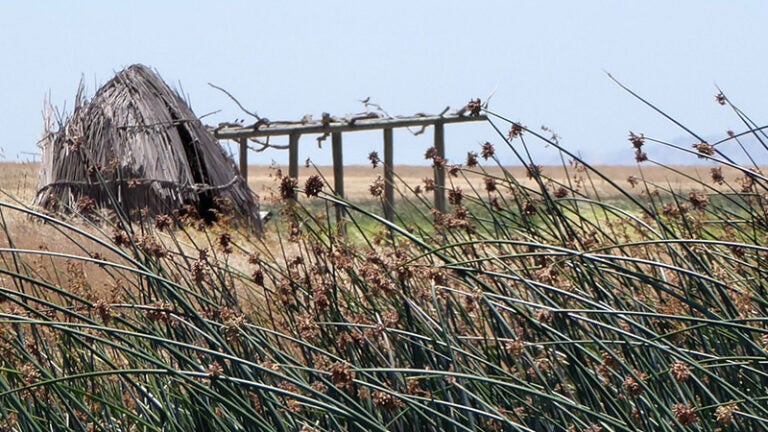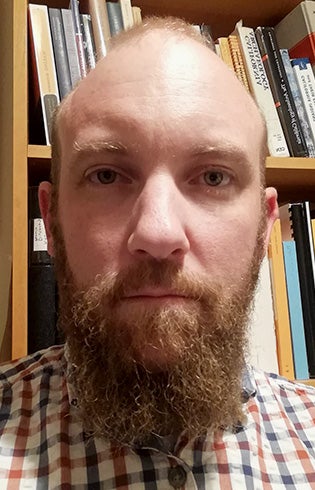
Bringing an Indigenous language back from the brink of extinction
- Patwin people were the original inhabitants of Northern California, but decades of forced assimilation nearly erased their language.
- Alumnus and linguist Lewis Lawyer decided to add to the tribe’s language revitalization efforts by writing a book that outlines Patwin grammar.
- The book is now available for free to members of the Patwin community.
The Patwin language was once spoken in hundreds of different communities around the southwest portion of the Sacramento River, near Davis, California. After decades of forced assimilation, however, Patwin is considered one of the world’s most endangered languages.
Thanks to Lewis Lawyer, who completed a degree in linguistics at the USC Dornsife College of Letters, Arts and Sciences in 2005, the Patwin language finally has its first published grammar book, A Grammar of Patwin (University of Nebraska Press, 2021).

Lawyer was inspired to write the book after discovering that the University of California, Davis, where he was completing a PhD in linguistics, was situated on the site of an ancient Patwin village. For hundreds of years, the tribe hunted, fished and wove baskets from the reeds along Putah Creek, which has now been diverted into a drainage basin for the campus.
Starting in the mid-1700s, Indigenous Californians were forced to leave their ancestral homes and live and work in missions built by the Spanish. Later, they were sent to American boarding schools for “reeducation,” where speaking their native tongue was outlawed. Use of Patwin declined, and by the 2000s, there was only one remaining native Patwin speaker.
For Lawyer, the thought that an entire language could be lost fueled his desire to write a book that could help preserve it. “Language encodes a whole culture. Every time any language stops being spoken there’s a whole system of knowledge that isn’t being used anymore,” he says.
Practical linguistics
Lawyer originally enrolled at USC as a jazz major, but a class in linguistics sparked a new interest, so, he changed course, double-majoring in linguistics and music instead. He went to work conducting research in the tech world after graduating.
He soon realized he missed academia, so he returned to school at UC Davis for a PhD in linguistics in 2008. He initially thought he’d write his dissertation on something “relatively theoretical” but began to feel a calling to write something more practical.
“I really wanted to take all these years of linguistics training that started at USC Dornsife and write something that people could actually use,” he says.
He reached out to a contact in the Native American Studies department at the university to see if his skills could be of use. He learned of the history of the Patwin people and the ongoing efforts to revitalize their language.
The revelation resonated on a personal level. “Davis is my home; it’s where I grew up. I’d never heard of the language, never heard of the people and had no idea that they were still there,” says Lawyer.
Help from the archives
He set about establishing a relationship with Patwin tribes and Patwin people working on its language efforts. As a non-Indigenous person, Lawyer was aware that his outreach could be perceived as invasive.
“I made sure that they knew that I wasn’t claiming the language and that I wasn’t claiming any ancestry. If they wanted me to buzz off, I would buzz off. I ended up with a pretty good relationship with them,” says Lawyer.
He dove into the archives, tracking down written records and recordings. One of his earliest sources were the papers of Platon Vallejo, stored at the Autry Museum of the American West in Los Angeles.
Vallejo was the son of Mariano Vallejo, a Spanish general in Northern California who founded the city of Sonoma on Patwin land. Platon was raised by an enslaved Patwin man, who taught Platon and his brother phrases of the Indigenous language.
“When he was an old man, [Platon] realized that nobody spoke this language anymore, and so he sat down and wrote down all the words that he remembered and tried to translate some prayers,” says Lawyer.
The right to speak
Lawyer is now based in Cambridge, England, where he is the reference systems manager for dictionaries at Cambridge University Press. He recently helped design the Cambridge English Thesaurus.
In between work and caring for his family, Lawyer still lends his time to translating texts and advocating for disappearing languages. A collection of resources on Patwin is available for free to anyone of Patwin descent on Lawyer’s website.
Lawyer views this work as contributing to a basic human right. The right to a language is, after all, enshrined in such treaties as the 2007 United Nations Declaration on the Rights of Indigenous Peoples.
“An indigenous group’s language is their human right. It’s not America’s place to say, ‘Well, not enough people speak this language’ or ‘English is more useful anyways,’” says Lawyer. “If they want to keep on speaking their language, if they want a reference book, that’s a fundamental right.”